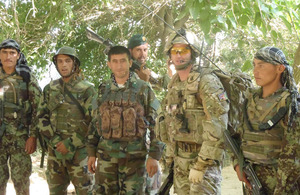On patrol with the Afghan Army during Ramadan
Throughout the fasting period of Ramadan the Afghan National Army (ANA) are still working hard with the help of their British mentors to ensure that the local population in Helmand remains safe and protected.

Captain George Duffield, 9th/12th Royal Lancers, with some of the Afghan National Army soldiers he is responsible for training and mentoring [Picture: Crown Copyright/MOD 2011]
Ramadan is the Islamic month of fasting in which participating Muslims refrain from eating and drinking during daylight hours and resistance of all temptations is encouraged. It is intended to teach Muslims about patience, spirituality, humility and submissiveness to God.
Ramadan is also a time when Muslims take time out from worldly affairs and focus on self-reformation, spiritual cleansing and enlightenment, and they are encouraged to pray more often than normal.
During Ramadan therefore soldiers from the ANA go out on patrol in temperatures approaching 50 degrees Celsius without eating or drinking anything during the entire day.
The warriors of the 1st Tolay (Company) based at Patrol Base 4 in Nahr-e Saraj, Helmand province, undertake their patrols helped and advised along the way by their British Army partners.
Captain George Duffield, 9th/12th Royal Lancers, is the Officer Commanding the 1st Tolay Advisory Team:
The ANA made the decision that they would continue to patrol and train throughout Ramadan despite the added hardship of their fasting during daylight hours,” he said. “They have remained focused and continue to work hard, which has been very impressive.
After they have completed their morning patrols, the warriors of the 1st Tolay throw themselves into a training programme aimed at increasing their all-round military skills.
The training is organised by the ANA advisors from B Squadron, 9th/12th Royal Lancers, who are deployed with other 7th Armoured Brigade units on Operation HERRICK 14 as part of Task Force Helmand.
The Tolay Advisory Training Team (TATT) works with the ANA on a daily basis and focuses on long term ANA development; ensuring systems, processes and operational planning are in place for when they will take on sole responsibility for security. Members of the TATT patrol every day with the ANA and monitor their development and self-sufficiency while taking part in operations to secure the local areas.
The training programme qualifies the Afghan troops in five key military disciplines: counter-improvised explosive device training, navigation, battlefield first aid, weapon handling and patrolling skills.
Captain Duffield says these are the basic skills needed for soldiering:
The training which we are delivering will develop the Tolay to a stage where they will be able to start conducting their own lessons and pass the knowledge amongst themselves - like us they see it as a key capability.
The training takes place during the relative cool of the morning and is a mixture of lectures and hands-on practice. It can be slow as everything has to be translated through an interpreter, often into the two official languages - Pashto and Dari. Yet the warriors all appear to enjoy themselves and are always keen to learn.
Sergeant Ajmal is serving with the1st Tolay:
We like the lessons as we are learning so much,” he said. “It is hard for us as it is Ramadan, but we know how important it is.
Given the high temperatures and harsh conditions, the lessons are kept short so the warriors are able to concentrate.
Warrant Officer Class 2 Nick Galley is another of the advisors from 9th/12th Royal Lancers. He is Second-in-Command of the TATT:
We have to get the balance right between ensuring that we impart as much knowledge as possible with the limitations of Ramadan in mind,” he said. “They know that the lessons may save their life, so they are really determined to pay attention.
The non-commissioned officers who perform the best during their training will be chosen for an instructor cadre which will develop them as subject matter experts. This ensures that in the future the valuable skills will be taught to Afghans by Afghans.